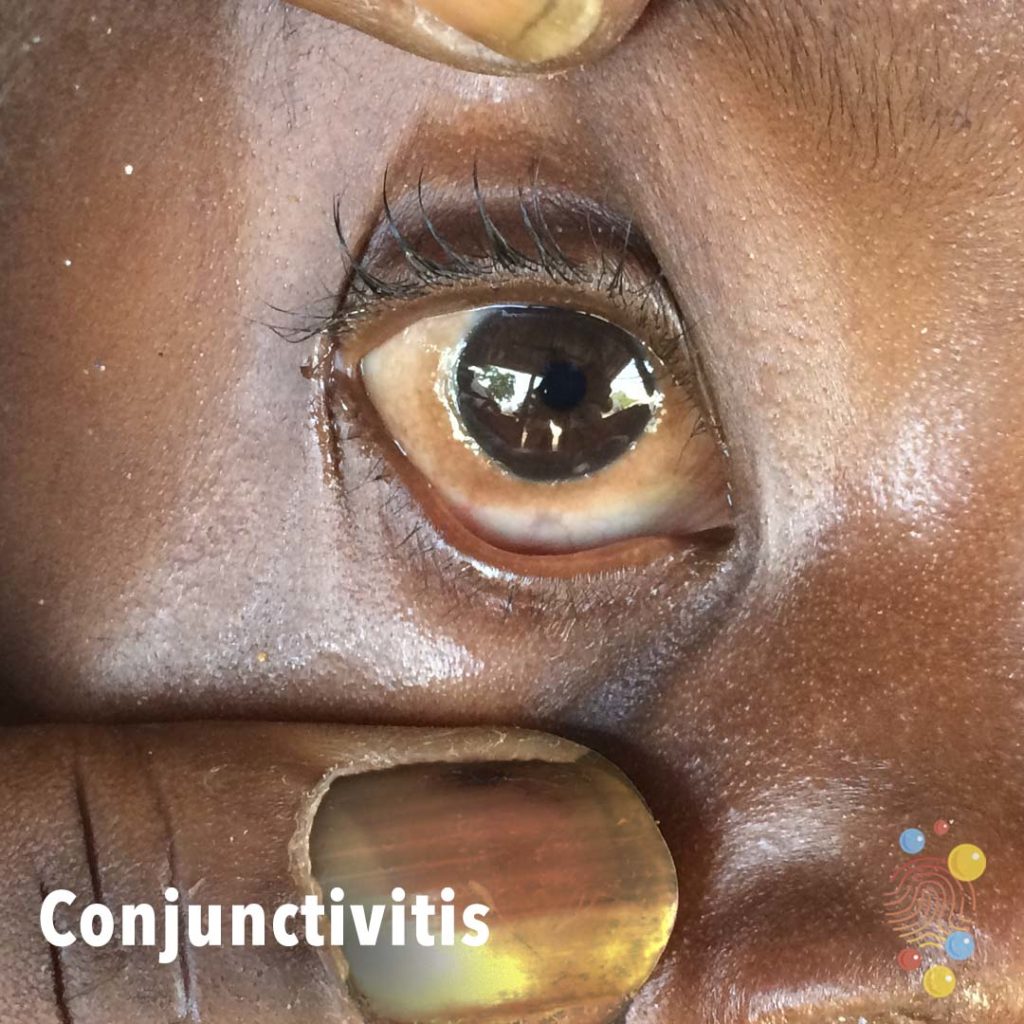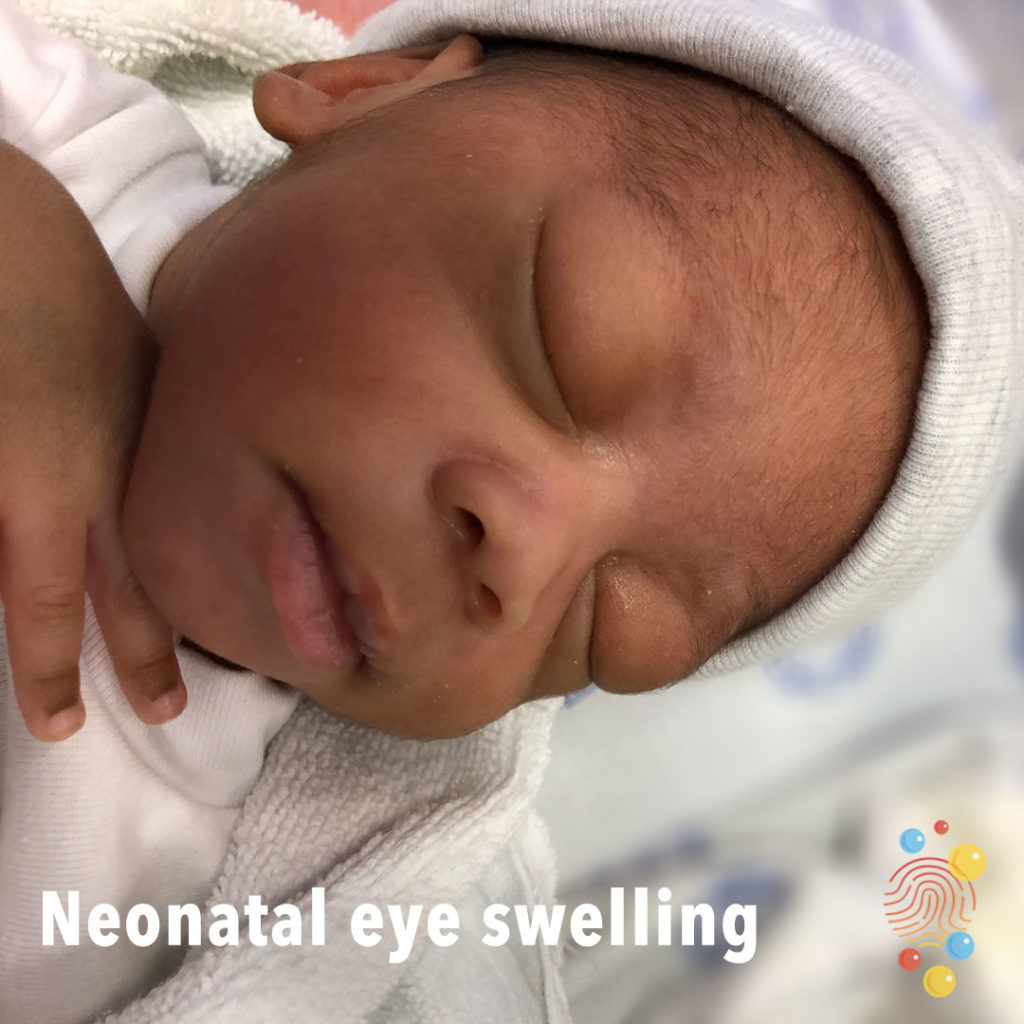Conjunctivitis
Conjunctivitis is the inflammation of thin layer of tissue which covers the front of the eye (Conjunctiva)- it is a common cause of red eye. It affects children, especially under 5 years of age. It can either be caused by an infection, allergy or sometimes the eye coming in contact with irrtants like shampoo, chlorinated water etc.
Infectious conjunctivitis is contagious and may spread to other household members. Allergic conjunctivitis is more common in children with allergies such as hay fever.
If your child has conjunctivitis, they may have:
- a red or pink eye (or both eyes)
- redness behind the eyelid
- swelling of the eyelids, making them appear puffy
- excessive tears
- a yellow-green discharge from the eye which dries when your child sleeps, causing crusting around the eyelids
- a gritty feeling (like there is sand in the eye)
- itchiness of the eyes and eye rubbing
- children with allergic conjunctivitis almost always rub their eyes excessively. They may also have an itchy or runny nose and sneezing
Your child does not need to be excluded from school or childcare if they have conjunctivitis.

Mild conjunctivitis - no treatment required, routine care
Note- Sticky eys with redness in Newborn should be referred to ophthalmologist ( Eye specialist)

Peri-orbital cellulitis ( Swelling of soft tissue around eyes) - needs same day review (amber)
Images in this section are from Don't Forget the Bubbles, used with permission
If your child has any of the following:
- Severe pain and red eye, eye is propped out, painful to move
- Loss of vision
- Has a red eye after it has been injured or exposed to chemicals
- Is pale, mottled and feels abnormally cold to touch
- Has blue lips
- Too breathless to talk / eat or drink
- Has a fit/seizure
- Is extremely agitated (crying inconsolably despite distraction), confused or very lethargic (difficult to wake)
- Has a rash that does not disappear with pressure (see the 'Glass Test')
- Becomes pale, mottled and feels abnormally cold to touch
- Is going blue around the lips
- Too breathless to talk / eat or drink
- Has a fit/seizure
- Becomes extremely agitated (crying inconsolably despite distraction), confused or very lethargic (difficult to wake)
- Develops a rash that does not disappear with pressure (see the 'Glass Test')
- Is under 3 months of age with a temperature of 38°C / 100.4°F or above (unless fever in the 48 hours following vaccinations and no other red or amber features)
You need urgent help
Go to the nearest Hospital Emergency (A&E) Department or phone 999
If your child has any of the following:
- Severe pain in eyes
- Red swollen eye, unable to open eye due to swelling
- Extreme sensitivity to light (photophobia)
- Red sticky eye in a neonate ( within 30 days of birth)
- Changes in vision including flashing lights (vision can appear blurred or misted because of discharge smeared over the surface of the eye, but this will usually clear on blinking or wiping the eyes)
- Copious progressive discharge
- Soft lens use with symptoms of photophobia (Sensitivity to light) and watering
- Severe headache
- Persistent vomiting
- Blisters develop on the skin next to the eye
- Babies under 28 days with a red eye(s) or lots of pus from their eye(s) - note although a sticky eye due to a blocked tear duct is a very common condition in babies (and does not require medical review), this condition does not cause a red eye
- Is finding it hard to breathe
- Seems dehydrated (sunken eyes, drowsy or not passed urine for 12 hours)
- Is becoming drowsy (excessively sleepy) or irritable (unable to settle them with toys, TV, food or picking up) - especially if they remain drowsy or irritable despite their fever coming down
- Has extreme shivering or complains of muscle pain
- Is 3-6 months of age with a temperature of 39°C / 102.2°F or above (but fever is common in babies up to 2 days after they receive vaccinations)
- Continues to have a fever of 38.0°C or above for more than 5 days
- Is getting worse or if your are worried
You need to contact a doctor or nurse today
Please ring your GP surgery or call NHS 111 - dial 111
If none of the above features are present, continue care at home.
Self care
Continue providing your child’s care at home. If you are still concerned about your child, call NHS 111 – dial 111
What should you do?
If your child has mild conjunctivitis, gentle cleaning of the eyes with cotton balls soaked in warm water may help your child feel better.
Clean in one direction only, outwards from the inside (nose side) of the eye. This prevents the other eye becoming infected if only one eye is affected. Discard the cotton ball each time to prevent reinfection.
Do not try to clean inside the eyelids as this may cause damage to the inside of the eye. Lubricating eye drops such as ‘artificial tears’ may give some relief.
Although infective conjunctivitis is contagious, the likelihood of it spreading is not high unless there is close contact with others. To reduce the risk of spread, they should wash their hands regularly (especially after rubbing their eyes) and avoid sharing towels, pillows, eye drops, make-up with others until the discharge from their eyes has cleared. Most children with conjunctivitis do not need treatment with oral antibiotics or antibiotic eye drops, irrespective of whether their infection is caused by a virus or bacteria.
Irritant conjunctivitis will clear up as soon as whatever is causing it is removed.
Allergic conjunctivitis can usually be treated with anti-allergy medications such as antihistamines. If possible, you should avoid the substance that triggered the allergy. Speak to pharmacist about antihistamine use for your child.
It's best not to wear contact lenses until the symptoms have cleared up. Any sticky or crusty coating on the eyelids or lashes can be cleansed with cotton wool and water.
Washing your hands regularly and not sharing pillows or towels will help prevent it spreading.
How long will your child's symptoms last?
Most conjunctivitis in children is mild and usually clears within 1-2 weeks. If treatment is needed , the type of treatment will depend on the cause.
Where should you seek help?
- If it is non-urgent, speak to your local pharmacist or health visitor.
- If your child has any of the above features, urgently seek help from your GP surgery. For an urgent out-of-hours GP appointment, call NHS 111.
- You should only call 999 or go your nearest A&E department in critical or life threatening situations.
Health visitors are nurses or midwives who are passionate about promoting healthy lifestyles and preventing illness through the delivery of the Healthy Child Programme. They work with you through your pregnancy up until your child is ready to start school.
Health Visitors can also make referrals for you to other health professionals for example hearing or vision concerns or to the Community Paediatricians or to the child and adolescent mental health services.
Contact them by phoning your Health Visitor Team or local Children’s Centre.
Sound advice
Health visitors also provide advice, support and guidance in caring for your child, including:
- Breastfeeding, weaning and healthy eating
- Exercise, hygiene and safety
- Your child’s growth and development
- Emotional health and wellbeing, including postnatal depression
- Safety in the home
- Stopping smoking
- Contraception and sexual health
- Sleep and behaviour management (including temper tantrums!)
- Toilet training
- Minor illnesses
For more information watch the video: What does a health visitor do?
School nurses care for children and young people, aged 5-19, and their families, to ensure their health needs are supported within their school and community. They work closely with education staff and other agencies to support parents, carers and the children and young people, with physical and/or emotional health needs.
Primary and secondary schools have an allocated school nurse – telephone your child’s school to ask for the contact details of your named school nurse.
There is also a specialist nurse who works with families who choose to educate their children at home.
Sound Advice
Before your child starts school your health visitor will meet with the school nursing team to transfer their care to the school nursing service. The school nursing team consists of a school nursing lead, specialist public health practitioners and school health staff nurses.
They all have a role in preventing disease and promoting health and wellbeing, by:-
- encouraging healthier lifestyles
- offering immunisations
- giving information, advice and support to children, young people and their families
- supporting children with complex health needs
Each member of the team has links with many other professionals who also work with children including community paediatricians, child and adolescent mental health teams, health visitors and speech and language therapists. The school health nursing service also forms part of the multi-agency services for children, young people and families where there are child protection or safeguarding issues.
If you’re not sure which NHS service you need, call 111. An adviser will ask you questions to assess your symptoms and then give you the advice you need, or direct you straightaway to the best service for you in your area.
Sound advice
Use NHS 111 if you are unsure what to do next, have any questions about a condition or treatment or require information about local health services.
For information on common childhood illnesses go to What is wrong with my child?
A&E departments provide vital care for life-threatening emergencies, such as loss of consciousness, suspected heart attacks, breathing difficulties, or severe bleeding that cannot be stopped. If you’re not sure it’s an emergency, call 111 for advice.


